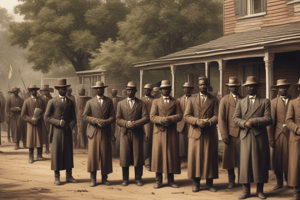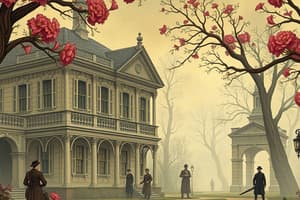Podcast
Questions and Answers
What was the purpose of the Freedmen's Bureau?
What was the purpose of the Freedmen's Bureau?
- To maintain military control in the South
- To provide education to freedmen and white refugees (correct)
- To offer loans to Confederate leaders
- To promote black codes
Who led the Freedmen's Bureau?
Who led the Freedmen's Bureau?
General Oliver O. Howard
Andrew Johnson was Lincoln's Vice President.
Andrew Johnson was Lincoln's Vice President.
True (A)
What was Lincoln's 10 Percent Plan?
What was Lincoln's 10 Percent Plan?
What did the Wade-Davis Bill demand?
What did the Wade-Davis Bill demand?
Johnson's Reconstruction Plan enfranchised all Confederate leaders.
Johnson's Reconstruction Plan enfranchised all Confederate leaders.
What were Black Codes aimed at?
What were Black Codes aimed at?
What did the Civil Rights Bill of 1866 accomplish?
What did the Civil Rights Bill of 1866 accomplish?
What did the Fourteenth Amendment declare?
What did the Fourteenth Amendment declare?
Who led the radicals in the Senate?
Who led the radicals in the Senate?
Match the following terms with their definitions:
Match the following terms with their definitions:
What was the purpose of the Force Acts of 1870-1871?
What was the purpose of the Force Acts of 1870-1871?
What did the Tenure of Office Act require?
What did the Tenure of Office Act require?
Seward's Folly refers to the purchase of Alaska.
Seward's Folly refers to the purchase of Alaska.
Flashcards are hidden until you start studying
Study Notes
Freedmen's Bureau
- Established in 1865, provided food, clothing, medical care, and education to freedmen and white refugees.
- Achieved significant educational success by teaching 200,000 African Americans how to read.
General Oliver O. Howard
- Served as the leader of the Freedmen's Bureau.
- Known for his sympathetic stance towards black individuals and their rights.
Andrew Johnson
- Vice President under Lincoln, assumed presidency after Lincoln's assassination.
- Known for his humble beginnings as a tailor, making him the most modestly born president in U.S. history.
10 Percent Plan
- Proposed by Lincoln in 1863 for Reconstruction.
- Allowed a Southern state to rejoin the Union if 10% of its 1860 voters pledged allegiance to the U.S. and emancipation.
- Faced strong opposition from Republicans who deemed it too lenient.
Wade-Davis Bill
- Introduced in 1864 as a counterproposal to Lincoln's 10 Percent Plan.
- Required a majority of a state’s voters to take an allegiance oath rather than just 10%.
Johnson's Reconstruction Plan
- Announced in May 1865, it excluded certain Confederate leaders from voting, notably those with property valued over $20,000.
- Allowed these leaders to seek personal pardons from Johnson.
Black Codes
- State laws aimed at creating a stable, subservient labor force among freed blacks.
- Designed to maintain a system similar to slavery without using the term.
Sharecropping System
- Emerged post-war, trapping both black and some white laborers in cycles of debt and poverty, making them economically dependent on landowners.
Civil Rights Bill (1866)
- Conferred American citizenship to blacks and countered the effects of the Black Codes.
- Initially vetoed by Johnson, it was subsequently passed by Congress, overriding the veto.
Fourteenth Amendment
- Ratified in 1868, defined all American-born or naturalized individuals as citizens, irrespective of race.
- Reduced voting power for states denying suffrage to black individuals and barred former Confederates from public office.
Congressional Election of 1866
- Marked by Republican dominance due to widespread public discontent with Johnson's policies.
Senator Charles Sumner
- Prominent radical leader in the Senate, advocating for racial equality beyond mere black liberation.
Representative Thaddeus Stevens
- Leader of radical Republicans in the House, closely collaborated with Sumner.
- Actively supported black rights and oversaw the Joint Committee on Reconstruction.
Military Reconstruction Act (1867)
- Divided the South into five military districts, each controlled by a Union general, to enforce reconstruction policies.
Ex Parte Mulligan (1866)
- Supreme Court decision asserting that military tribunals were not authorized to try civilians in areas with functioning civil courts even during wartime.
Redeemers
- White southern Democrats who regained control of Southern states after Union troops withdrew, leading to a solid Democratic South.
Scalawags
- Derogatory term for Southern Republicans, mainly former Unionists and Whigs, accused by former Confederates of profiting from the South's misfortunes.
Carpetbaggers
- Northerners who moved south after the Civil War, seeking personal gain and political power, often seen as opportunists.
Ku Klux Klan
- White supremacist group formed to intimidate blacks and deter them from voting; resorted to violence and murder against those who resisted.
Force Acts (1870-1871)
- Legislation aimed at suppressing the activities of the KKK and protecting black voters against intimidation.
Disfranchisement
- Refers to systemic barriers that prevented black individuals from voting, including intimidation, fraud, and legal trickery.
Tenure of Office Act (1867)
- Required presidential approval from the Senate before any cabinet member could be dismissed from office.
- Intended to hinder Johnson's ability to remove Edwin Stanton, a Republican ally.
Edwin Stanton
- Secretary of War under Lincoln, remained in the position during Johnson's presidency, serving as an intelligence source for radical Republicans.
Seward's Folly
- Term for Secretary of State William Seward's acquisition of Alaska from Russia, viewed as foolish at the time; later recognized for its strategic value.
Studying That Suits You
Use AI to generate personalized quizzes and flashcards to suit your learning preferences.




